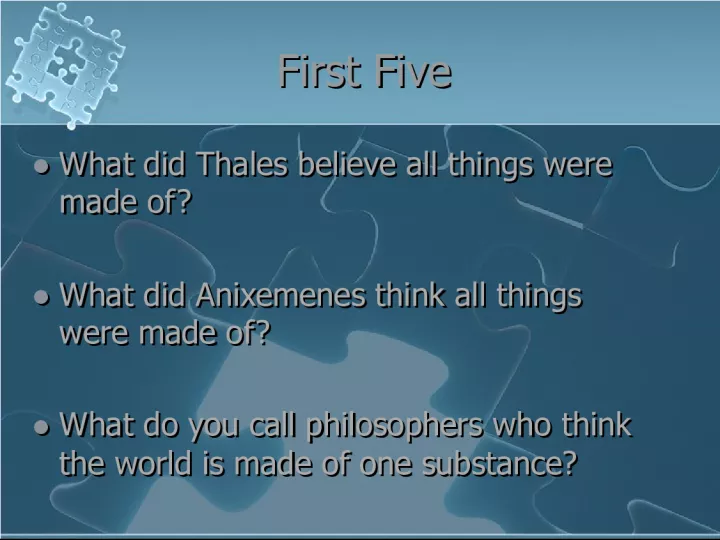The Philosophy of Thales and Anixemenes


The first five philosophers in ancient Greece, Thales believed all things were made of water while Anixemenes thought all things were made of air. What do you think?
- Uploaded on | 0 Views
-
 anke
anke
About The Philosophy of Thales and Anixemenes
PowerPoint presentation about 'The Philosophy of Thales and Anixemenes'. This presentation describes the topic on The first five philosophers in ancient Greece, Thales believed all things were made of water while Anixemenes thought all things were made of air. What do you think?. The key topics included in this slideshow are . Download this presentation absolutely free.
Presentation Transcript
1. First Five First Five What did Thales believe all things were made of? What did Anixemenes think all things were made of? What do you call philosophers who think the world is made of one substance? What did Thales believe all things were made of? What did Anixemenes think all things were made of? What do you call philosophers who think the world is made of one substance?
2. Introduction to Philosophy Introduction to Philosophy Part II Part II
3. Remember the Monists Remember the Monists Early philosophers attempted to find order in the world Rejected the idea that the gods ran things Tried to find out what we were made of Water, air, the infinite, etc. The “Pre Socratics” Early philosophers attempted to find order in the world Rejected the idea that the gods ran things Tried to find out what we were made of Water, air, the infinite, etc. The “Pre Socratics”
4. Three Branches of Philosophy Three Branches of Philosophy Metaphysics: What is real, how did everything come into being, is everything orderly or chaotic? Epistemology: Theories about knowledge and truth Axiology: Theories about values (right and wrong) Metaphysics: What is real, how did everything come into being, is everything orderly or chaotic? Epistemology: Theories about knowledge and truth Axiology: Theories about values (right and wrong)
5. Ancient Europe Ancient Europe
6. Ancient Greece Ancient Greece
7. The Sophists The Sophists Sophia : Greek word meaning “wisdom” Sophists : The wise ones Sophists are revolutionaries Individualistic, arrogant, argumentative Teach only for pay Willing to take any side of any argument Sophia : Greek word meaning “wisdom” Sophists : The wise ones Sophists are revolutionaries Individualistic, arrogant, argumentative Teach only for pay Willing to take any side of any argument
8. Sophists Sophists Sophists travel from city to city Learn about different cultures Realize not every culture thinks the same, or has the same beliefs about how to do things There may not be ONE right way to do things Sophists travel from city to city Learn about different cultures Realize not every culture thinks the same, or has the same beliefs about how to do things There may not be ONE right way to do things
9. Sophists—The Original Hippies Sophists—The Original Hippies
10. Relativism Relativism There is no ONE way to do things We can’t say something is ALWAYS right or ALWAYS wrong. Everything happens in context Different situations merit different beliefs “Everything is relative” There is no ONE way to do things We can’t say something is ALWAYS right or ALWAYS wrong. Everything happens in context Different situations merit different beliefs “Everything is relative”
11. The Classical Era The Classical Era Three philosophers usher in a golden era of thought and ideas in Ancient Greece They provided the classic formula of Western Philosophy Focused on knowledge, truth, and values Three philosophers usher in a golden era of thought and ideas in Ancient Greece They provided the classic formula of Western Philosophy Focused on knowledge, truth, and values
12. Socrates Socrates
13. Plato Plato
14. Aristotle Aristotle
15. Raphael- School of Athens Raphael- School of Athens
16. Plato and Aristotle Plato and Aristotle
17. Socrates Socrates
18. Discussion: You’re a Sophist Discussion: You’re a Sophist Come up with five reasons why the Death Penalty should be allowed Five reasons why the Death Penalty should not be allowed Be ready to argue either side Come up with five reasons why the Death Penalty should be allowed Five reasons why the Death Penalty should not be allowed Be ready to argue either side
19. Discussion: You’re a Sophist Discussion: You’re a Sophist Come up with five reasons why high school students should have to wear uniforms. Come up with five reasons why high school students should NOT have to wear uniforms. Be ready to argue either position Come up with five reasons why high school students should have to wear uniforms. Come up with five reasons why high school students should NOT have to wear uniforms. Be ready to argue either position







